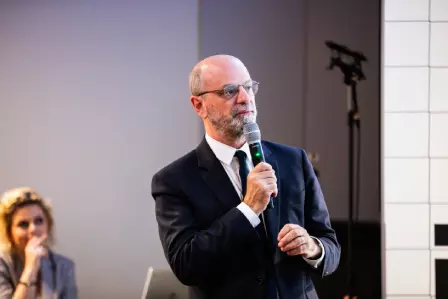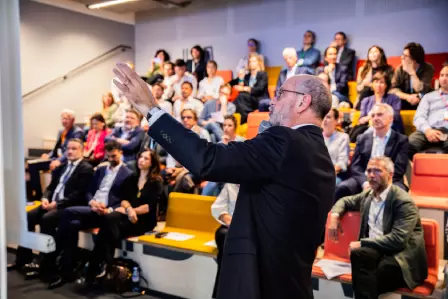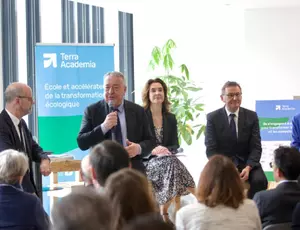Initiated by Veolia, the "+1, for an ecology in action" collective is a unique cooperation and consultation system. It brings together individuals representative of all categories of Veolia's stakeholders with the goal of finding a common path towards ecological transformation.
A recent workshop in the presence of Jean-Michel Blanquer at the Terra Academia school and accelerator for ecological transformation was an opportunity for this collective, a true amplifier of cooperation, ideas and innovation, and an operational tool, to develop nine golden rules of cooperation.
These rules, based on collective intelligence and the willingness to engage together, are essential if cooperation is to be a key driver of effective and successful action.They also help accelerate the concrete implementation of Veolia's stakeholder strategy.
The golden rules of cooperation between stakeholders to accelerate ecological transformation:
1. Cooperation emerges from a common purpose
The source of cooperation is a shared purpose that transcends the individual interests of the organizations involved. It is crucial to define this purpose, agree on its objectives, and find a common playing field where all participants can collaborate effectively.

2. Cooperation does not always start from a specific project. It can begin with an encounter
Cooperation does not always require a specific project from the outset. It can simply start with an encounter, a shared desire to work together, and the willingness to share experiences and ideas. This desire for engagement is often motivated by a common cause or challenges to solve.
3. Cooperation involves identifying allies
To succeed in a cooperation project, it is essential to map out the relevant and interested actors who would be open to joining the project and have pertinent expertise and solutions to contribute to the debate.
4. Cooperation involves identifying divergent viewpoints
Understanding and resolving dissent is crucial for strengthening project implementation. Identifying actors who oppose the project, understanding the reasons for their disagreements, and integrating these different perspectives helps collectively resolve controversies.
5. Cooperation involves a diversity of profiles and experiences
A diversity of profiles enriches cooperation through a multitude of perspectives and experiences. This not only helps anticipate various challenges but also fosters innovation and leads to new opportunities.
6. Cooperation means finding and speaking a common language
For effective cooperation, it is essential to establish a common language and shared understanding of the issues and solutions. Rephrasing and verifying the alignment of all participants ensures coherent and collective action.
7. Cooperation requires energy but saves it in the long run
Cooperation demands that all stakeholders make the effort required to get involved. Some may be essential to the success of the project, even if they aren’t the most closely involved. It’s more about engaging them at every stage of the project.
8. Cooperation must think long term
Mobilizing stakeholders requires a significant initial effort, but this investment pays off in the long run. Engaging participants throughout the project, through conviction and storytelling, ensures better implementation and sustainability of initiatives.
9. Cooperation must be embodied on a local scale
Strategic projects must be anchored in a local vision while aiming for global impacts. This duality combines the depth of local actions with the scope of global objectives, reinforcing cooperation’s effectiveness and reach.
These nine rules, resulting from discussions of the +1 collective, illustrate the importance of cooperation to ecological transformation. By integrating these principles, actors can strengthen their actions and progress more quickly towards a sustainable and inclusive ecology.
Click here for more information on the 9 golden rules.




